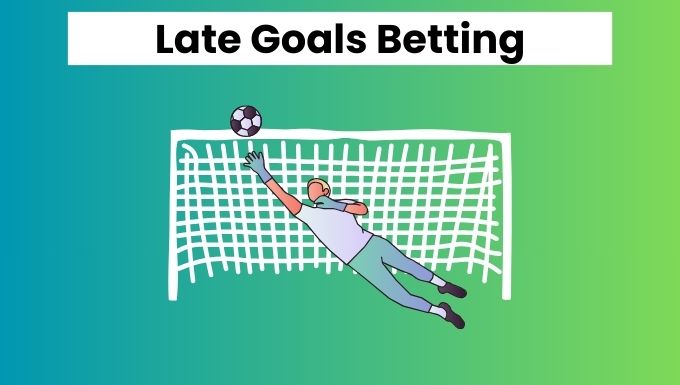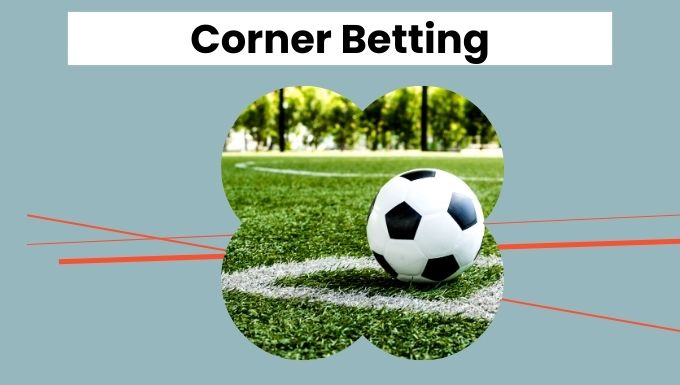The amazing feeling when a last-minute goal is scored in front of fans is like an adrenaline shot. The excitement, the rush makes you remember that moment for a lifetime and this common in football were by a favourite is in a stalemate with the other team. A good example is the match between Chelsea and Manchester City in the 2020/2021 Premier League season. Despite City being ahead a goal up in the first half, during the second half the Blues came back with a 63rd minute an equalizer goal by Hakim Ziyech.
During the dying minutes of the game when all hope for a win were ruled out, the left back Marcos Alonso made a late run into the box to receive the cross from the skipper Werner hitting it first time and lifting it up over the City keeper Ederson, completing the spectacular comeback. No one expected a win from Chelsea but with last minute goal strategy we can better predict a possible comeback and win a bet.

Late goals stats and records
The late goal strategy is not for the anxious since there is a lot of pressure especially if you are about to lose and the challenge is to maintain your cool. Experienced punters have nerves of ice, but an amateur will easily cash out, which is a smart move. The more experienced punter will however prefer to let the bet run or do a partial cash out option and this brings out the true risk of betting on last minute goals.
Top leagues have a high percentage of last minute goals especially if a team is known for not easily giving up during the match with constant offensive attacks and this attacks usually pay since the team has a reputation of not giving up until the final whistle is blow. With the Premier League showing a 35% of all goals being scored in 80th minute. This percentage is almost consistent in both Bundesliga, La Liga and Seria A, where a large number of late goals are stacked.
Pick a strategy
10 minute pick betting system
This strategy is flexible in that we can bet on the first or the last 10 minute of a game but in this case, we are focusing on last minute goals and is a common pick especially if you have mastered the skill of identifying games that have no last-minute goals. A good example is of teams almost equal in both strength and are close to each other in the league therefore there likely to be less or no goals at all during the second half.
Pick teams that are likely to be more possessive or defensive at the back since there is a likely chance they won’t risk a point in the second half countering their opponents but will change tactics to a possessive or defensive to protect a led. Avoid underdogs who are receiving a thrashing simple because they me be demoralized and are more likely to let the favourite win by a bigger goal margin.
Also teams with a red card are more likely to concede with a weakened backline and usually opponents tend to attack aggressively during the second half and in such cases it’s wise to focus on betting on the favourite to win with last minute goal. However, last minute goals are notorious for high odds and we have to be precise when picking a favourite to win. Unlike the last to score strategy the 10 minute focuses on the goal scored during the last 10 minutes rather than who scores it.
Last goal strategy
The last to score is a popular strategy backed by majority of punters. During live betting the odds are high and will fall in the dying minutes of a match. In last goal you should focus your attention on: Matches standing at a draw and matches whereby the underdog has been leading since the first half but is constantly being attacked. There more likely to concede that last goal.
Be patient and watch the game. Then pick a team to back for the last goal it may change or completely destroy your bankroll. Bookmakers sometimes offer high odds initially to shift or try to balance markets but being patient won’t hurt and it may be worth it at the end.
When to strike hard?
There are times we should avoid striking but when is the right moment to pounce? Well here are tips to lookout for in case you aren’t that lucky in betting:
- Pay attention to matches whereby both teams are motivated to score and now one is showing a sign of being weak or tired. The most likely winner is a favourite to win well that may not be the case with offensive attack the underdog can get control of the ball and return a devastating counter attack.
- Look at head to head stats, there positions in the league, there home and away records and how many goals they have conceded in previous encounters. General information is important and previous results have been known to be repeated.
- Take a look on current ratings, team form in terms of tactics are they playing an offensive strategy and how many shots on target are they making per game. The average information from this stats can place the team in position whereby they are predictable.
- Take time and search for local leagues whereby teams are known to have goal fest. Such teams are known for odd or even goal score at fulltime.
- Be informed on what team is playing whether it’s a championship final there playing, league title or just for points. When better informed we can make better decisions.
Why Late Goals Happen
Late goals aren’t random, they happen for clear reasons, and if you’ve watched enough football, you start seeing the patterns. Here’s what I’ve noticed over the years:
First, fatigue. Players aren’t machines. After 70 minutes, legs get heavy, concentration drops, and mistakes creep in. A tired defender misses a tackle, a midfielder loses track of a runner, and suddenly; goal. Some teams train for endurance better than others, but even the fittest players slow down late in games.
Second, tactical changes. Coaches throw on fresh attackers, switch formations, or push defenders forward chasing a result. If one team starts overloading the box while the other sits back, gaps open up. The last 10 minutes of a tight game often turn into a scramble, and that’s when late goals fly in.
Third, mental pressure. When a game is tied or one team is clinging to a lead, nerves take over. Defenders panic, goalkeepers second-guess themselves, and attackers take more risks. I’ve seen so many last-minute goals come from a simple long ball or set-piece because someone switched off at the worst moment.
And finally, time-wasting backfires. Teams trying to kill the game slow it down, lose rhythm, and invite pressure. Then one mistake—a cheap free-kick, a bad clearance and the other team punishes them.
Best Leagues And Teams To Target For Late Goals
If you want to cash in on late goals, you’ve got to know where to look. Not all leagues are created equal—some are goldmines for last-minute chaos, and others are snooze-fests. Here’s what I’ve learned:
Leagues to Target:
- German Bundesliga – This league is made for late goals. Teams attack non-stop, fitness levels are insane, and defenders crack under pressure. The last 15 minutes are almost guaranteed action.
- English Championship – Less quality means more mistakes, and the pace is relentless. Teams go all-out for promotions or to avoid relegation, so late goals happen constantly.
- Dutch Eredivisie – Open play, weak defending, and a “score more than you” mentality. If a game’s tight after 70 minutes, chances are it won’t stay that way.
- Brazilian Serie A – Fitness fades fast in the heat, and games open up late. Plus, Brazilian teams love a dramatic finish.
Teams to Watch:
- Bayern Munich & Dortmund (Bundesliga) – They keep pressing until the final whistle and often break stubborn defenses late.
- Swansea & Blackburn (Championship) – These two are either scoring or conceding late—every single season.
- Ajax & Feyenoord (Eredivisie) – They attack in waves, and if they’re not winning, they’ll throw everything forward late.
- Flamengo & Palmeiras (Brazil) – High-energy teams that wear opponents down and strike late.
Best Markets For Late Goals
When betting on late goals, picking the right market is just as important as picking the right game. Some options offer better odds, while others give you a safer way to profit from those chaotic final minutes.
One of my favorites is “Goal After 75:00” or “Goal After 80:00.” The later you go, the bigger the odds, and if you’ve been watching the game unfold, you can time your bet perfectly. If one team is pushing hard or the defense looks exhausted, this bet can be a goldmine.
Another solid choice is “Over 1.5 Second-Half Goals.” This works well in games where the first half was quiet, but you expect things to open up late. If there’s already been a second-half goal, bookies sometimes keep the odds decent for another one, especially if the game is still competitive.
For a bit more risk but bigger rewards, “Next Goal” betting can be great. If a team is throwing everything forward, you can back them to score next at decent odds. But be careful, if they’re leaving gaps at the back, the opposition might be more likely to counter and score.
And if you want real drama, “Goal in Stoppage Time” is a fun market. It doesn’t win as often, but when it does, it feels incredible.
Team-Specific Late Goal Markets Some bookies offer “Time of Team’s Next Goal” (e.g., 76-90 mins). If you know a team like Bayern or Man City loves late goals, this is a sneaky-good play.
Live Betting Strategies For Late Goals
Live betting on late goals is where things get exciting. The odds shift fast, and if you know what to look for, you can catch some great value before the bookies react.
First, watch the flow of the game. If one team is dominating possession, piling on pressure, and creating chances, a late goal is far more likely. Look for constant attacks, corners, and dangerous free kicks; these are signs that a goal is coming. On the other hand, if both teams look happy to see the game out, it’s probably best to skip the bet.
Fatigue is another big factor. If defenders are struggling to keep up with fast attackers, they’ll start making mistakes; poor clearances, sloppy fouls, or just losing concentration. This is when fresh substitutes can make the difference, especially if a pacey striker has just come on.
Another key moment is the final 10 minutes, especially if a team desperately needs a goal. If they’re throwing defenders forward, taking risks, and even sending their goalkeeper up for corners, it’s the perfect time to bet. The pressure often leads to a goal; either for them or on the counterattack.
Lastly, check the odds. If you’re getting a good price for a goal after the 75th or 80th minute and the game is open, it’s worth considering.
In conclusion, strive to be picking a strategy that works for you and you should also avoid betting on teams that have no motivation to win. Bad weather is another factor that is difficult predict since heavy pitch presents means players are forced to work harder to get goals.


